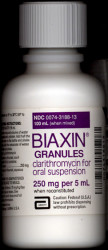Biaxin (clarithromycin) Coupons, Discounts & Cost
Biaxin belongs to the class of macrolide antibiotics. One way to save money on the Biaxin (clarithromycin) retail cost regardless of income and insurance status is to use Biaxin (clarithromycin) coupons or discount cards from RXCoupons. Use this Biaxin (clarithromycin) coupon at this online pharmacy and receive up to 75% off the sale price.
What is Biaxin (clarithromycin)?
Biaxin belongs to the class of macrolide antibiotics. The active substance of the drug fights bacteria in your body.
Biaxin is used to treat different types of bacterial infections such as sinusitis, tonsillitis, bronchitis, pneumonia, skin infections and bacterial ulcer. The drug may be used for other purposes as well.
When you should NOT take Biaxin (clarithromycin)
Do not start Biaxin therapy if you are taking some other drugs such as cisapride, pimozide or terfenadine. These drug interactions may cause irregular heartbeat (arrhythmia). The drug should not be mixed with ergot alkaloids.
Biaxin should not be used in patients with hypokalemia, severe liver failure, cholestatic jaundice, porphyria, hypersensitivity to the components of the drug.
Tell your doctor if you have kidney or liver disease before taking Biaxin. You may need a smaller dose of the drug. Your doctor may want you to remain under observation during the therapy.
It is unknown whether Biaxin can negatively affect prenatal development. If you are pregnant, do not take this drug without consulting your doctor.
It is unknown whether Biaxin is able to penetrate into breast milk. If you are breastfeeding, do not take this medication without consulting your doctor.
How should I use Biaxin (clarithromycin)?
Use Biaxin (tablets, syrup, suspension) as directed by your doctor. Take each dose of the drug with a full glass of water (200 ml). You may take Biaxin with food, milk or on an empty stomach.
As a rule, patients should take the tablets twice a day with an interval of 12 hours (follow your doctor's instructions).
Shake Biaxin syrup or suspension before use. Use a special measuring spoon to dose the right amount.
Take Biaxin within the whole period of time prescribed by your doctor, even if you feel better. You can expect to gradually feel better, but this is not the prognosis for complete recovery.
Store the medication at room temperature, away from moisture and heat. Do not keep the suspension in the refrigerator.
What happens if I overdose?
Symptoms of Biaxin overdose include nausea, vomiting, diarrhea, stomach cramps. You need to seek immediate medical attention if Biaxin overdose is suspected.
What are the possible side effects of Biaxin (clarithromycin)?
Stop taking the drug and seek medical attention if any of the following symptoms occur while taking Biaxin: - Allergic reactions (urticaria, difficulty breathing, airway obstruction, swelling of the lips, tongue, face); - Liver damage (yellowing of the skin or eyes, nausea, abdominal pain or abdominal discomfort, abnormal bleeding and bruising, severe fatigue).
Other, less serious side effects: - Nausea, vomiting, diarrhea, abdominal pain, dizziness, fatigue, headache, rash.
There may be other side effects not listed above. Tell about any unusual side effects or worsening symptoms to your doctor.
What are Biaxin (clarithromycin) interactions with other drugs?
Biaxin may cause dangerous side effects when you mix it with the following medications: - Antihistamines such as terfenadine and astemizole; - Anticoagulants such as warfarin; - Antiepileptic drugs such as carbamazepine, phenytoin and valproic acid; - Asthma control medications such as theophylline; - Antiarrhythmic medications such as digoxin and disopyramide; - Benzodiazepines such as diazepam, triazolam, alprazolam and others; - Other antibiotics.
Do not start treatment with Biaxin if you are taking any of the drugs listed above.
Biaxin may interact with other drugs not listed above. You should always consult your doctor before using Biaxin with any other drugs.

